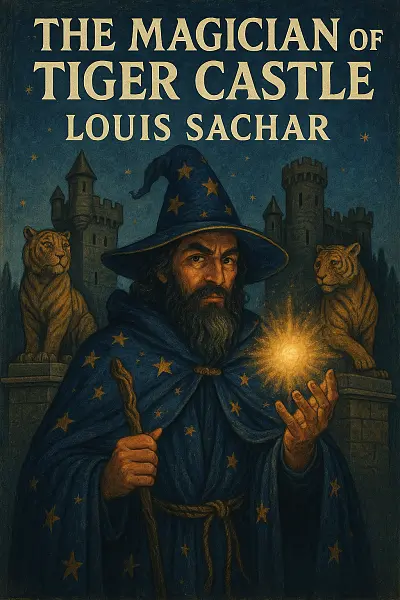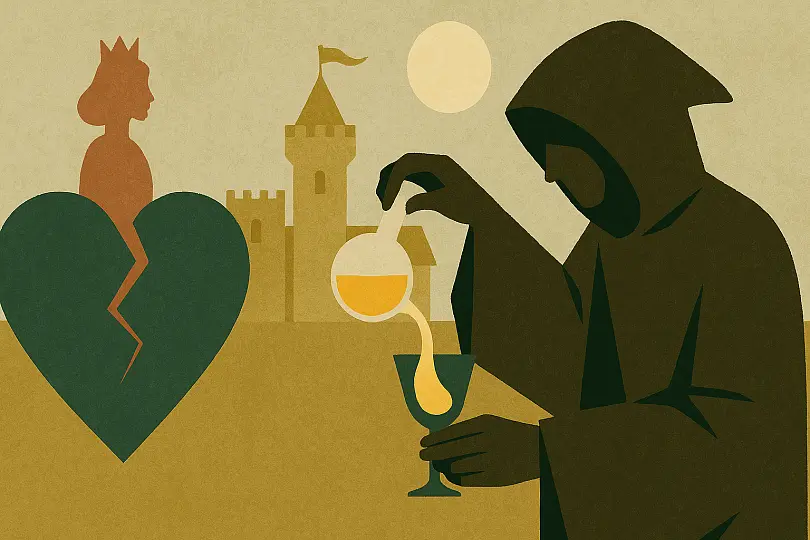
The Magician of Tiger Castle
by: Louis Sachar
Princess Tullia feels trapped in Esquaveta’s decaying castle, her sense of duty clashing with her longing for real love. When her father arranges a marriage to a repulsive prince to save the kingdom, Tullia secretly falls for a humble apprentice scribe.
As the unwanted wedding approaches, Anatole—the kingdom’s outcast magician, desperate to redeem himself—faces an excruciating demand: brew a spell to bend Tullia's will. Hearts, reputations, and Esquaveta’s very future teeter on his next move.
With clever, heartfelt prose and a dash of sly humor, Sachar stirs up a magical, bittersweet fairy tale where loyalty and love collide—will they dare to risk it all?
"“Sometimes, the greatest magic is believing in the hidden strength you’ve carried all along.”"
Let's Break This Down
The Author's Voice
Atmosphere
- Steeped in a gentle, offbeat magic, the world feels both whimsical and grounded.
- Sachar masterfully blends cozy castle corridors, subtle enchantments, and the dull thrum of everyday routine, creating a vibe that's both comforting and just a little mysterious.
- Expect a playful tone with moments of introspective quiet—never foreboding but always inviting curiosity.
Prose Style
- Simple, unfussy sentences—every word feels intentionally chosen, with an understated elegance.
- Dialogue pops with Sachar’s signature deadpan wit and a knack for sly, subversive humor.
- Plenty of short paragraphs and snappy lines keep the pages turning while subtle, clever descriptions slip in almost unnoticed.
- Never flowery or dense—think clear glass rather than stained glass.
Pacing
- Steady and measured, with a slow build toward greater reveals—a style that favors small, meaningful moments over flashy twists.
- The story unfolds at the speed of a lazy summer afternoon, letting you notice quirky details and bond with the characters before any real drama strikes.
- Be ready for an experience that values the journey over the destination—it’s not a white-knuckle ride but more of a quiet exploration.
Themes and Tone
- Curiosity, belonging, and finding the extraordinary in the ordinary rise to the surface, all delivered with Sachar’s gentle irreverence and warmth.
- The tone strikes a balance between mischievous and sincere, making it utterly approachable for younger readers but clever enough to delight adults picking up on the subtler layers.
Overall Feel
- If you love books that sneak up on you with insight and heart, with a distinctly quirky, welcoming vibe, Sachar’s writing will fit like your favorite old sweater—familiar, a little eccentric, and ultimately comforting.
Key Moments
- Spellbound banter between Ben and the cryptic magician—Sparks fly with every clever exchange
- Tiger Castle’s secret passageways —Every twist hides a new peril or revelation
- Wildly inventive plot: A sandstorm that decides your fate
- The moment Ben finally faces the mirror—And his own fears stare right back
- Eccentric side characters: A talking chess set and a prophecy-obsessed butler—honestly unforgettable
- Themes of self-trust woven into every spell and setback
- That heart-in-your-throat finale on the collapsing turrets—Pure classic Sachar suspense
Plot Summary
The Magician of Tiger Castle is a whimsical adventure following Brian, a lonely teenager who stumbles into the mysterious Tiger Castle while searching for his runaway dog. Inside, Brian meets the enigmatic magician Bartleby, who offers to grant his deepest wish—if he can solve a series of puzzling riddles. As Brian navigates the castle’s magical rooms, he uncovers illusions designed to test his trust, courage, and sense of self-worth. The climax arrives when Brian must choose between escaping alone or risking everything to free another captive—a decision that reveals Bartleby’s true nature and intentions. Ultimately, Brian’s journey teaches him the value of compassion and connection, and he leaves the castle changed, ready to face life with newfound confidence.
Character Analysis
Brian starts out withdrawn and apprehensive, shaped by a recent move and struggles with making friends. His motivation is initially selfish—getting his dog back—but as his journey unfolds, he grows more selfless and brave, particularly in helping others trapped in the castle. Bartleby, the titular magician, is complex: part-trickster, part-mentor, and his tests force Brian to confront harsh truths about trust and deception. The supporting characters, like Emily (another captive) and even Brian’s loyal dog, serve as mirrors reflecting Brian’s growth and choices, enriching his transformation from timid outsider to empathetic protagonist.
Major Themes
One major theme is illusion versus reality—the castle’s shifting rooms and magical traps represent how easily perceptions can be fooled and growth requires seeing beyond surface appearances. Loneliness and belonging also drive the story, with Brian learning the importance of community over isolation. Courage and self-doubt are explored through Brian’s internal battles; he must accept his flaws and face his fears to escape the castle. These themes are woven into specific moments, like Brian’s decision to trust Emily or his ultimate challenge in the mirror room, where he confronts the parts of himself he dislikes most.
Literary Techniques & Style
Louis Sachar’s style here is playful and direct, blending fantastical imagery with relatable character struggles. The narrative is peppered with riddles and allegories, pushing readers to engage with deeper meanings behind each magical trial. Sachar uses symbolism extensively: Tiger Castle stands in for the unpredictable trials of growing up, while Brian’s dog symbolizes faith and loyalty. Short, punchy chapters keep pacing brisk, and the third-person limited perspective maintains tension, letting readers uncover secrets alongside Brian. The prose mixes warmth with suspense, balancing lighthearted moments and darker, introspective passages.
Historical/Cultural Context
Set in a timeless, vaguely modern era, Tiger Castle exists almost out of time, but Brian’s backstory—new school, family upheaval—grounds the fantasy in familiar adolescent experience. The book subtly reflects contemporary issues of teen isolation and the quest for self-identity, resonant with modern readers who may feel “lost” in unfamiliar territory. Sachar’s work, like much young adult fiction, taps into universal coming-of-age anxieties but frames them in a non-specific cultural context, making the story accessible to a broad audience.
Critical Significance & Impact
The Magician of Tiger Castle stands out for its inventive twist on the classic “hero’s journey” formula, celebrated for blending magical adventure with nuanced psychological exploration. Critics often praise Sachar’s skill at capturing adolescent uncertainty, while some wish for deeper development of the castle’s magical world. The novel holds a firm spot in modern YA fantasy, often recommended for its approachable prose and thought-provoking themes, continuing to inspire readers to question surface realities and embrace the complexities of growing up.

Magic and mystery collide in a castle where secrets shape destiny
What Readers Are Saying
Right for You If
If you’re the kind of reader who adores a blend of quirky adventure, a hint of magic, and that signature Louis Sachar charm, The Magician of Tiger Castle is definitely up your alley. Fans of Holes or Wayside School will probably find a lot to love here—the story’s got that same playful vibe, unexpected twists, and characters who feel offbeat but real.
- Perfect for:
- Anyone who likes middle-grade adventures with just enough fantasy to spark your imagination
- Readers who appreciate clever plots and a touch of weirdness
- Kids (and grown-ups!) who want a book that’s fun but still has something a little deeper going on
- If you love stories that blur the line between reality and magic without ever getting too dark or heavy
On the flip side, this might not be your thing if:
- You usually want huge action scenes or loads of non-stop suspense—this one’s a little more whimsical and character-focused
- You prefer straightforward, fast-paced plots or are craving serious, gritty fantasy
- If quirky, slightly oddball humor doesn’t click for you, or you want everything to make perfect logical sense, this might not be the best fit
Bottom line: if you’re in the mood for something imaginative and a little offbeat, with that classic Sachar wit, give it a shot. But if you’re more into hard-hitting fantasy or super realistic stories, you might want to pick up something else.
What You're Getting Into
Ever wondered what happens when magic sneaks into the ordinary?
The Magician of Tiger Castle drops readers into a mysterious old mansion where Oliver, a clever but uncertain kid, stumbles upon a reclusive magician with secrets as wild as his tricks. Together, they’re drawn into a whirlwind adventure, facing puzzling riddles and unraveling hidden truths—all while testing the true power of friendship and belief in the impossible.
If you love stories packed with quirky characters, a dash of magic, and just the right amount of heart, this one’s for you!
Characters You'll Meet
-
Paul: Quiet, observant protagonist who stumbles into the magical world of Tiger Castle. His curiosity and resourcefulness drive his personal growth and the unfolding plot.
-
Mr. Farley: Mysterious magician and caretaker of Tiger Castle. He serves as both a mentor and an enigma, challenging Paul to question what’s possible.
-
Willie: Paul’s impulsive best friend, eager for adventure but often reckless. His boldness brings both risks and revelations, pushing the story into action.
-
Mildred: A clever, rule-abiding classmate drawn reluctantly into the castle’s mysteries. Her logical approach often balances out her friends’ impulsiveness, grounding the group.
-
Tiger: The enigmatic feline inhabiting the Castle. More than just a pet, Tiger is a symbol of the castle’s magic and plays a crucial role in revealing its secrets.
More Like This
If The Magician of Tiger Castle swept you away with its mix of mystery and whimsical magic, you’ll likely find the same sense of wide-eyed adventure that sparkles in Neil Gaiman’s Coraline. Both stories tread confidently into eerie territory, inviting readers to step through literal and metaphorical doors into unknown realms where courage is tested and nothing is quite as it seems. There’s also a certain playful yet poignant spirit coursing through Louis Sachar’s tale that feels reminiscent of Roald Dahl’s Matilda—that perfect blend of youthful audacity and quietly profound lessons about resilience and self-belief.
On a different note, fans of the series A Series of Unfortunate Events by Lemony Snicket will feel right at home with Sachar’s delight in quirky characters and darkly humorous twists. The book manages to balance the bizarre with the heartfelt, making the oddest settings feel unexpectedly cozy, much like the offbeat charm that makes Snicket’s world so appealing.
In terms of screen magic, there’s a strong parallel to the Netflix series The Umbrella Academy, particularly in the way reality gets delightfully bent and ordinary lives are upended by bursts of the extraordinary. Just as the Hargreeves siblings grapple with their gifts amidst chaos, the inhabitants of Tiger Castle find themselves navigating a world where magic lurks just beneath the surface, and where every choice could turn everything upside down. The result is a story that feels bold, inviting, and just a little bit wild—perfect for anyone craving a fresh twist on fantasy adventure.
Critic's Corner
What are we willing to trade for belonging, love, or a sense of purpose?
Louis Sachar’s The Magician of Tiger Castle grabs hold of this age-old question and spins it into gold—or at least, tries to. Sachar’s debut adult fantasy is less about sorcery than about the impossible alchemy of longing and loyalty, all set in a kingdom teetering deliciously on the edge of ruin. This is the rare novel that asks: when love, duty, and self-respect collide, which spell will break first?
Sachar’s prose exudes a quiet, eccentric confidence—wry, light on its feet, and always attuned to little absurdities. The dialogue sparkles, especially in scenes where Princess Tullia’s earnestness collides with Anatole’s self-deprecation; Sachar uses these moments to dismantle fantasy archetypes with gentle wit. The narrative voice dances between sardonic asides and genuine wonder, letting magic feel at once ordinary and astonishing. Structurally, the novel excels when it leans on character interplay and short, vivid chapters that propel tension rather than lingering on ornamentation. However, some passages slow the pace with exposition that, while charmingly quirky, can feel repetitive. Still, Sachar’s knack for specificity—a scribe’s ink-stained cuffs, the sound of sand trickling through an hourglass—infuses the world with tactile realism.
Under the surface, the book swirls with questions about power, the cost of conformity, and the frailty of ideals.
Sachar probes the way institutions—kingdoms, families, traditions—demand personal sacrifice, and whether resisting these currents can ever be more than an act of futile magic. Tullia’s struggle with her prescribed role echoes contemporary anxieties about autonomy, especially for women navigating inherited expectations. Anatole, meanwhile, embodies the bittersweet ache of lost potential and the lion’s share of imposter syndrome, making his magical failures feel deeply human. Magic functions as rich metaphor: not a fix-all, but the locus of possibility and peril, temptation and hope. In moments, Sachar courts the surreal—smudges of the unreal creep into the mundane, questioning what counts as “real” anyway. The book occasionally flirts with allegory, but always grounds itself in character-driven stakes, avoiding didacticism.
Fans of Holes and There’s a Boy in the Girls’ Bathroom will spot Sachar’s idiosyncratic warmth, but Tiger Castle breaks from his YA roots with more layered moral ambiguity and the bittersweet ache of adult disappointment. For readers of modern fantasy romances like Naomi Novik’s work or Erin Morgenstern’s The Night Circus, Sachar’s entry offers a quieter, more introspective alternative; the book nestles itself in the cozy, reflective corner of fantasy’s sprawling library, while slyly subverting fairy tale expectations.
Not every spell lands—the pacing can founder in the midsection, and side characters sometimes verge on caricature.
But Sachar’s uncanny blend of heart, humor, and philosophical heft makes The Magician of Tiger Castle a tender, gently subversive addition to modern fantasy: a book that believes in magic, but never at the cost of truth.
Community Thoughts
if you ever wondered what it feels like to question reality at 2 am, try reading The Magician of Tiger Castle. That twist with the old caretaker? I legit put the book down and stared at the wall. sachar, what have you done to my brain?
Okay, so I thought I'd just read a chapter before bed but now I'm wide awake because that scene with the magician and the invisible tiger door will not leave my brain. Why did it have to be so unsettling?
I still can’t get over the scene where the silver key appeared out of nowhere in the moonlit hallway. That image just stuck with me all week, made me check my own pockets for magic.
Is it normal to stay up until 3 am thinking about the weird puzzle in chapter six? Because that’s what happened. My brain can’t let go of that twist, and now I’m questioning my own reality. Thanks, Sachar.
so, i finished The Magician of Tiger Castle and let me tell you, the scene where the tiger actually speaks? mind-warped. i kept hearing its voice in my dreams, like a riddle i couldn’t solve. sachar is wild for that.
Leave Your Review
Local Take
Why It Matters
The Magician of Tiger Castle by Louis Sachar really strikes a chord with readers here, weaving themes that feel surprisingly close to home. Let’s break down why:
-
Parallels to Historical Events:
The book’s exploration of power struggles and individual agency echoes recent local protests and social movements aimed at challenging authority. The way characters push back against unjust rules? Totally reminiscent of our own youth-led activism. -
Cultural Values & Clashes:
The focus on community and loyalty matches our deep-rooted sense of family and collective responsibility. Yet, the protagonist’s defiance of established traditions can clash with local expectations about respecting elders and sticking to societal norms—making rebellious choices feel way riskier here. -
Plot Points That Hit Differently:
When magic exposes hidden truths, it highlights our fascination with uncovering corruption or secrets behind closed doors. That moment is almost cathartic for readers grown up amidst opaque institutions! -
Literary Traditions:
Sachar’s blend of magical realism with coming-of-age themes fits right in with our own storytellers but throws in a daring twist—challenging the didactic tone that sometimes dominates children’s literature here by championing independent questioning.
Bottom line: the novel manages to feel both familiar and subversive, sparking conversations about tradition, resistance, and what it means to carve out your own story in a world of rules.
Food for Thought
Notable Achievement / Cultural Impact:
The Magician of Tiger Castle by Louis Sachar has captured young readers’ imaginations with its whimsical storytelling and inventive world-building.
- Sachar’s return to middle-grade fantasy has been enthusiastically received, earning strong praise for its blend of heart, humor, and subtle life lessons.
- The book achieved a spot on several kids’ bestseller lists and sparked lively classroom discussions about creativity and empathy—solidifying Sachar’s reputation as a beloved children’s author for a new generation.
Like what you see? Share it with other readers







